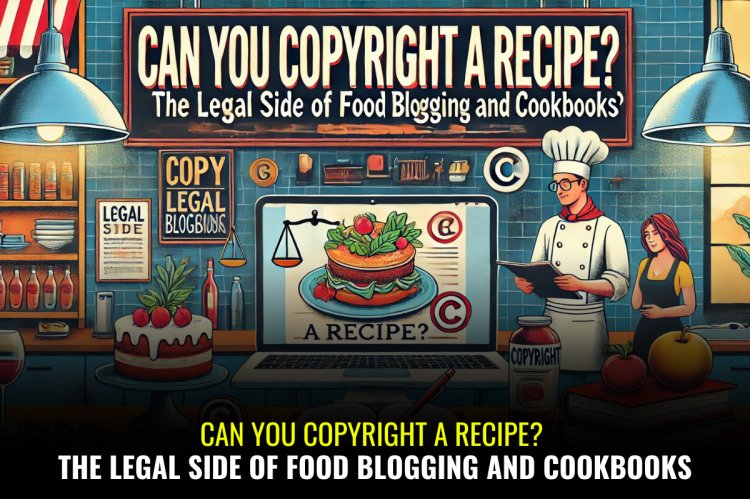Can You Copyright a Recipe? The Legal Side of Food Blogging and Cookbooks
This blog explores the legal aspects of copyright protection for recipes, highlighting what is and isn’t protected under copyright law. It provides guidance for food bloggers, cookbook authors, and chefs on safeguarding their creative works while navigating legal considerations in recipe sharing and publishing.

Introduction
If you’ve ever created an original recipe and shared it online or in a cookbook, you might have wondered: Can you copyright a recipe? The short answer is yes and no. Copyright law protects certain aspects of a recipe but not others. Whether you're a food blogger, cookbook author, or chef, understanding the legalities surrounding recipes can help you protect your work and avoid potential legal pitfalls.
What Copyright Law Covers
Copyright law protects original works of authorship that are fixed in a tangible medium. In the context of recipes, this means:
- Creative Expression: The way you describe, present, or narrate a recipe—such as in a blog post or cookbook—is protected by copyright. A story about how you created the dish, detailed instructions, or unique commentary are all eligible for copyright protection.
- Photographs and Illustrations: Any original images, drawings, or designs associated with your recipe are protected by copyright law.
- Cookbook Content: If your cookbook includes personal stories, detailed techniques, or unique writing styles, those elements are covered by copyright.
What Copyright Law Does NOT Cover
However, copyright does not protect mere facts, ideas, or functional elements. This means:
- Ingredient Lists: A list of ingredients is considered a factual compilation and is not eligible for copyright protection.
- Basic Cooking Instructions: Simple directions (e.g., "Mix flour and water and bake at 350°F for 20 minutes") are considered a procedure or method, which falls outside copyright protection.
- Common Recipes: Traditional or widely known recipes, such as chocolate chip cookies or spaghetti carbonara, cannot be copyrighted, as they are in the public domain.
To know more about this you can follow the link below:
How to Protect Your Recipes
Even though you can’t copyright a recipe in its basic form, there are ways to protect your work:
- Trademarking a Recipe Name: If your recipe has a unique, recognizable name (e.g., "The Ultimate Chocolate Dream Cake™"), you may be able to trademark it.
- Trade Secrets: If your recipe is a closely guarded secret (like Coca-Cola’s formula), keeping it confidential as a trade secret is an option.
- Copyrighting Your Cookbook or Blog Content: While individual recipes may not be protected, a collection of recipes in a creatively written cookbook or blog can be copyrighted.
- Licensing and Agreements: If you’re sharing recipes with collaborators, consider contracts that specify usage rights.
The Risks of Copying Recipes
If you’re a food blogger or cookbook author, be cautious about using others’ recipes without permission. While basic recipes aren’t copyrightable, copying the wording, presentation, or photographs from another creator’s work can lead to copyright infringement. Always give proper credit and rewrite recipes in your own words with original insights.
Conclusion
While you can’t copyright a simple recipe, you can protect the creative elements surrounding it. Whether you’re blogging, publishing a cookbook, or developing your signature dish, knowing the legal aspects of recipe sharing can help you navigate the culinary world with confidence. If you have a truly unique recipe or concept, consider consulting an intellectual property attorney to explore protection options.












